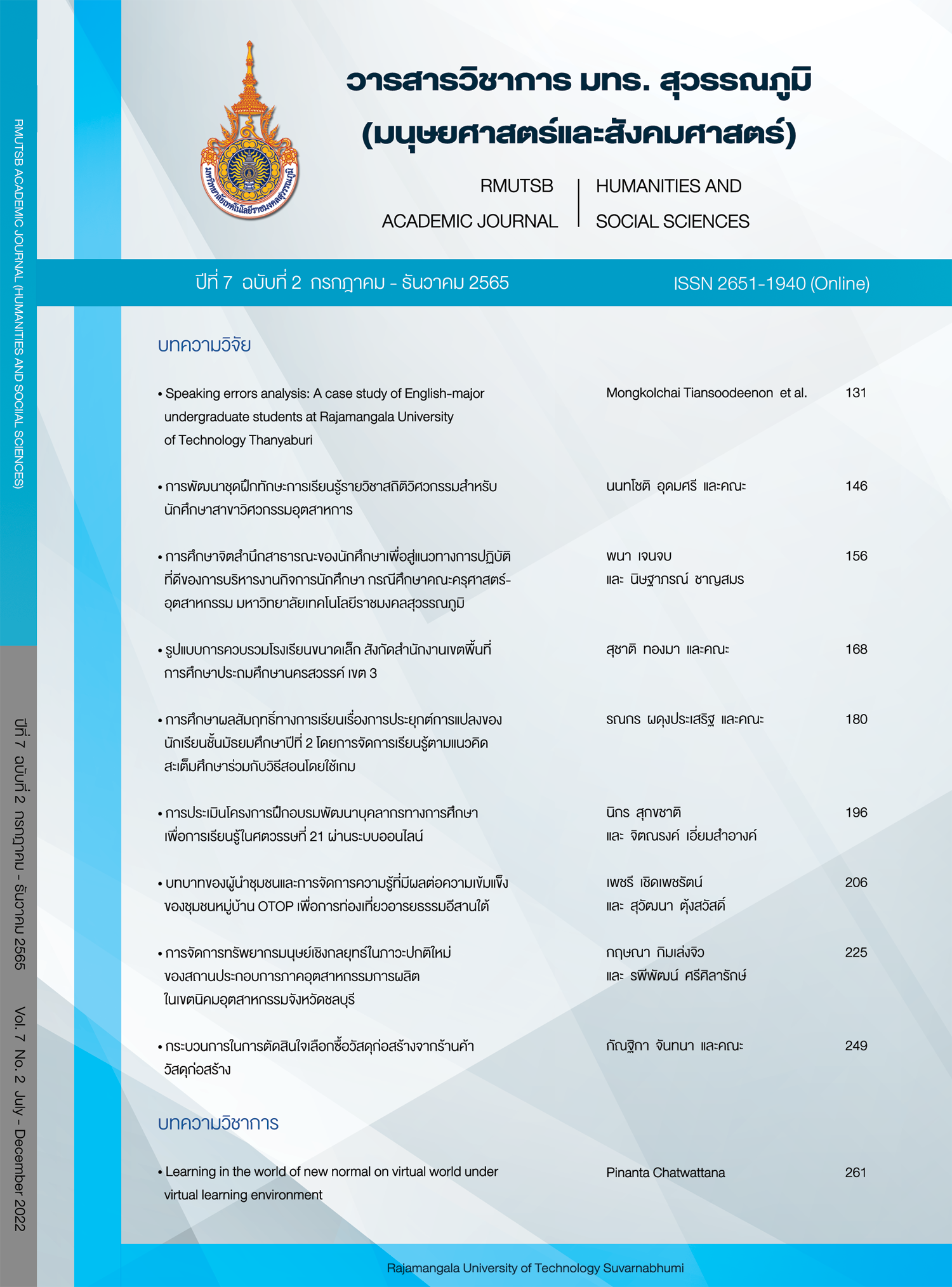Decision process to purchase at construction material stores
Main Article Content
Abstract
The objective of this research was to study the decision making process for purchasing construction materials from traditional and modern stores according to the consumer purchasing decision process, The sample group obtained using random sampling technique, consisted of 40 samples, divided into 2 groups, consumers who buy construction materials from traditional store and consumers who buy construction materials from traditional modern store. Research tools were in-depth interview, semi-structured interview, data collection by interview, and content analysis of data by grouping.
The results show that general customers who buy construction materials from traditional store will have the purchase process that is not complete for all 5 steps because urgency to use the product, the customers skip the process of searching information and evaluating alternatives. That is, when a problem is found, the customers will skip to decision making due to the rush and being near home. For general customers who purchase construction materials from modern store, the purchase process is complete due to having time to make a decision, no rush to use the product, and need a variety of choices, whether it's a variety of products, variety of brands, variety of quality, etc. Especially for the materials that are quite expensive or materials with a durable lifespan, the customers will have complete purchase decision process. The information from the construction contractors who bought construction materials from traditional store reveal that, the decision-making process for the purchase of construction materials is skipped at some stages, such as process of searching information and evaluating alternatives, because the contractor will have a construction material store that trades on a regular basis and getting a job in the area that used to work, thus they are familiar with the owners of traditional construction materials stores and immediately skipped the step of making a purchase decision. In contrary, the information from the contractors who buy construction materials from modern store, shows that the purchasing decision process is complete. If there is another promotion, they will go back to buy building materials from modern trade again.
From the results of the study, it is found that the decision making process in step 1, which is about recognizing the need or problem, is the most important step. That is, if the material is urgently needed, it will be purchased from a traditional store, if you the customers want variety and don't want to use it urgently, they will buy materials from modern store. For the last step of decision making process, which is post purchase behavior, it is found that if consumers are satisfied with the store, they will come back to buy again. Therefore, traditional construction materials stores can attract consumers if they increase the product variety of the stores, Such solution can be used as a guideline to improve and develop their construction materials stores by planning and formulating marketing strategies to be able to respond appropriately to the needs of customers.
Article Details

This work is licensed under a Creative Commons Attribution-NonCommercial-NoDerivatives 4.0 International License.
References
Aronson, J. (1994). A pragmatic view of thematic analysis. The Qualitative Report, 2, 1-3.
Braun, V., & Clarke, V. (2006). Using thematic analysis in psychology. Qualitative Research in Psychology, 3(2), 77-101.
Grewal, D., Roggeveen, A. L., Sisodia, R., Nordfält, J. (2017). Enhancing customer engagement through consciousness. Journal of Retailing, 93(1), 55-64.
Chalong, S. (2020). Modern trade business in building materials .. with the impact of 2020. GSB Research Online. Retrieved November 26, 2021, from https://www.gsbresearch.or.th/wp-content/uploads/2020/04/IN_
moderntrade_4_63.pdf (in Thai)
Kasiri, L., Teoh, K., Sambasivan, M., & Sidin, S. M. (2017). Integration of standardization and customization: Impact on service quality, customer satisfaction, and loyalty. Journal of Retailing and Consumer Services, 35, 91-97.
Kezia, H. M., Wilbard, J. G., Mbiliny, i. B., & Maliva, N. (2019). Factors influencing consumers’ convenience shopping of industrial products: A study of Kinondoni District. University of Dar es salaam Journals, 21(1), 23-33.
Khan, M. A., Khan, A., & Zubair, S. S. (2019). Online buying behavior: Prospects for online sale promotions strategies in Pakistan. UCP Management Review, 3(1), 25-40.
Kotler, P., & Armstrong, G. (2010). Principle of marketing (13th ed.). New Jersey: Pearson Prentice Hall.
Kotler, P., & Keller, K. L. (2012). Marketing management (14th ed.). New Jersey: Prentice Hall.
Lunkam, P. (2020). Construction material industry. Krungsri research online. Retrieved November 26, 2021, from https://www.krungsri.com/bank/getmedia/3713611b-cbeb-4536-ae80-38f06d248dad/IO_Construction_Materials_
_TH_EX.aspx (in thai)
Marshall, D. (2019). Convenience stores and well-being of young Japanese consumers. International Journal of Retail & Distribution Management, 47(6), 590-604.
Masruroh, R. (2017). The impact of modern retail minimarket towards the continuity of traditional retail businesses. IOP Conference Series: Materials Science and Engineering, 180, 012005.
Qazzafi, S. (2019). Consumer buying decision process toward products. International Journal of Scientific Research and Engineering Development, 2(5), 130-134.


